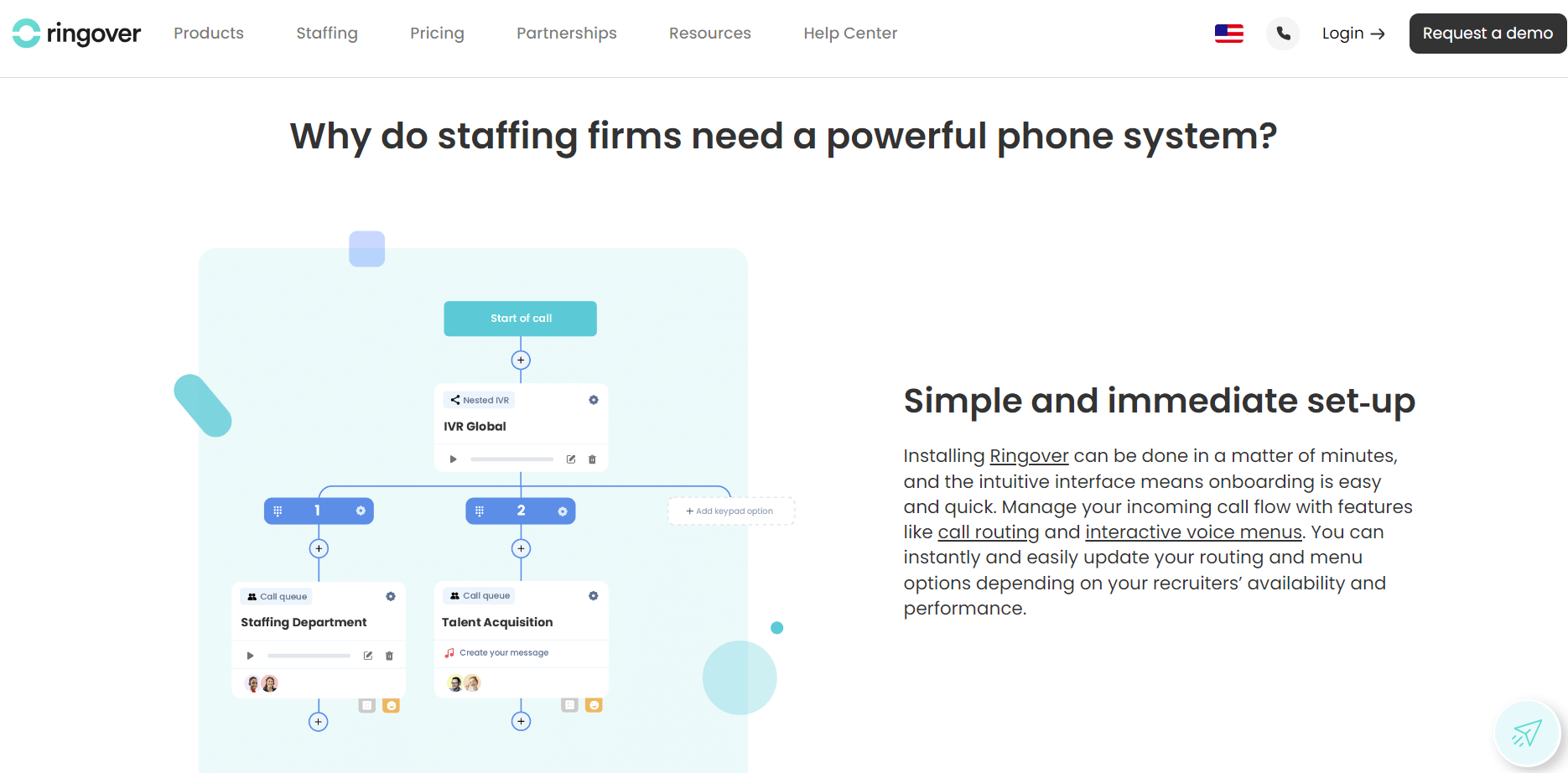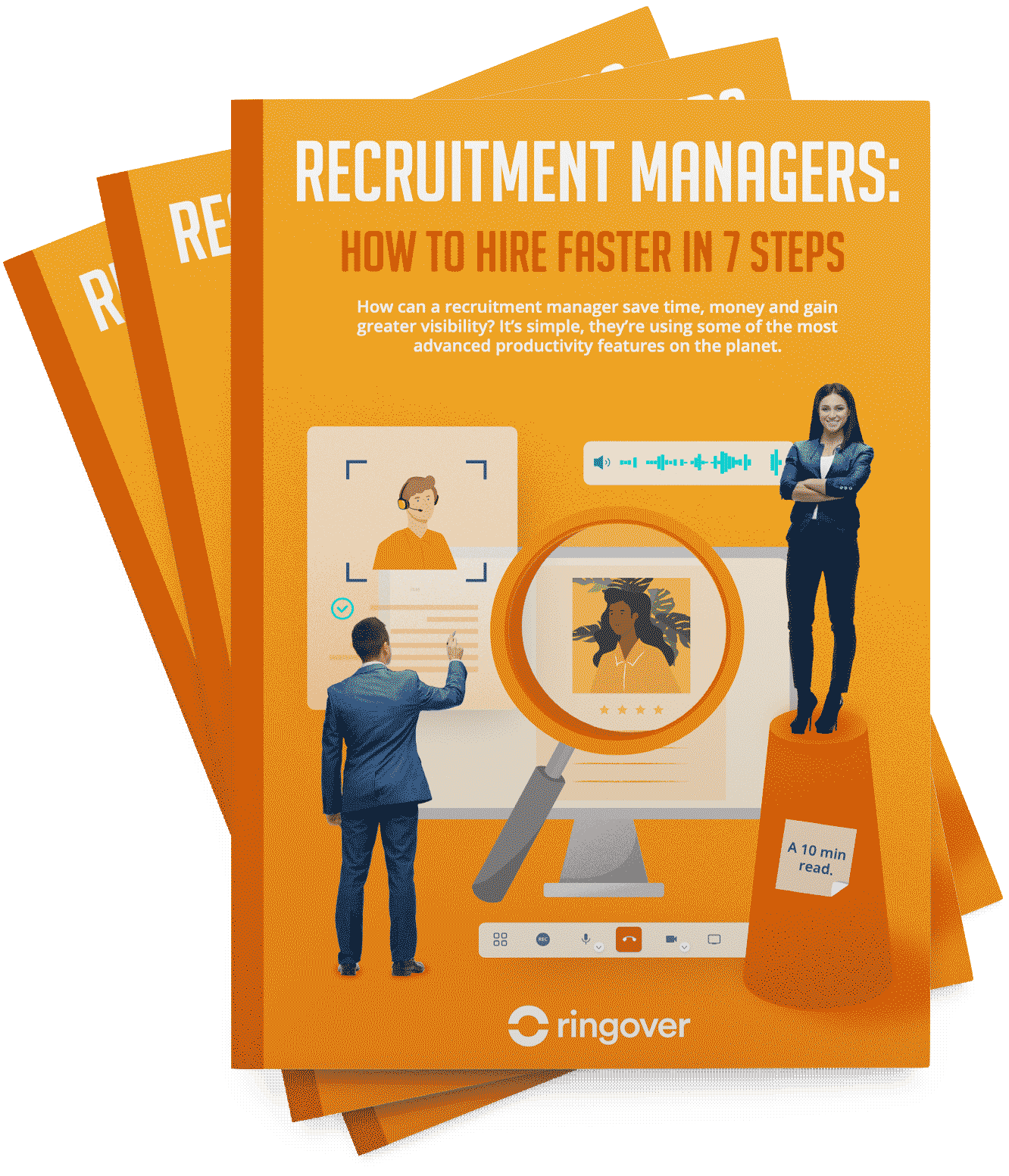Summary
- 10 Best Practices of Candidate Relationship Management
- How do you build good relationships with candidates?
- How do you build good relationships with hiring managers?
- What is candidate management?
- Why is candidate relationship management important?
- The Candidate Relationship Management Process
- Conclusion
- Candidate Relationship Management FAQ
Candidate relationship management (CRM) represents a thoughtful recruiting outreach strategy designed to attract, engage, and nurture future employees through a myriad of hiring management software and techniques.
CRM is pivotal in enhancing your employer brand, ensuring a positive experience for candidates, and establishing a reservoir of qualified, eager candidates for both immediate and long-term recruitment needs. Through this article, you'll discover the fundamentals of candidate management, its significance in recruitment strategy, operational insights, and tips for seamless implementation via staffing technology.
10 Best Practices of Candidate Relationship Management
1. Invest in a Comprehensive CRM Platform
A robust CRM platform is the backbone of any successful candidate relationship management strategy. Look for software that offers critical capabilities such as automated messaging, candidate tracking, and personalised communication tools. This will help you streamline your recruitment process and ensure that candidates receive timely and relevant updates.
2. Personalise Communication
Personalization is key to building meaningful relationships with candidates. Tailor your messages based on the candidate's skills, interests, and potential role within your company.
Use CRM tools to segment your talent pool and automate personalised messages that resonate with each group's unique interests and skills.
3. Acknowledge Every Candidate
It's important to acknowledge every candidate who applies, regardless of the outcome. This includes providing regular updates on the application status and offering feedback where possible.
This practice helps in maintaining a positive candidate experience and can lead to better employer branding.
4. Bring Humanity into the Process
While automation is useful, it's essential to bring a human touch to your interactions. Provide courteous and personalised feedback, especially to candidates who have progressed through several interview rounds.
This helps in creating a positive impression and fosters long-term relationships.
5. Foster Long-Term Relationships
Not every candidate will be the right fit for the current role, but they could be ideal for future positions. Keep in touch with candidates and maintain a connection over time.
Share company updates, industry news, and new opportunities that might interest them.
6. Provide Value-Added Content
Engage candidates by providing content that adds value to their career or personal growth. This could include webinars, whitepapers, or blog posts on industry trends and best practices.
Positioning your company as a thought leader can attract top talent and keep them engaged.
7. Use Data and Analytics
Leverage data and analytics to gain visibility into your recruitment metrics. Use CRM tools to track key metrics such as time-to-hire, cost-per-hire, and candidate quality. This data helps in making informed decisions and identifying areas for improvement.
8. Segment and Target Your Talent Pool
Segment your talent pool based on various criteria such as job title, location, and stage in the recruitment process. This allows you to tailor your communication and marketing efforts to specific groups, increasing the effectiveness of your outreach.
9. Create a Consumer-Like Experience
Candidates expect a consumer-like experience during the recruitment process. Use modern CRM systems to send targeted and consistent content to different pipelines, ensuring that candidates feel valued and engaged throughout the process.
10. Ensure Diversity, Equity, and Inclusion
Integrate diversity, equity, and inclusion (DEI) principles into your candidate relationship management strategy. Use CRM tools to track and analyse DEI metrics, ensuring that your recruitment process is fair and inclusive. This helps in attracting a diverse pool of candidates and fostering a positive employer brand.
How do you build good relationships with candidates?
Building strong relationships with candidates is essential for effective candidate relationship management. Implementing certain key strategies can significantly improve your connections with candidates:
1. Focus on the Candidate, Not the Job
It's essential to concentrate on the candidates' needs, goals, and aspirations during interactions, rather than solely on the job vacancy. Engage them in discussions about their career aspirations, strengths, and areas for improvement. This approach not only allows you to understand them better but also helps in aligning them with job opportunities that fit their goals.
2. Practise Active Listening
Active listening is key to establishing trust and understanding with candidates. Make sure to ask questions and listen carefully to their answers. This demonstrates respect for their opinions and time, and provides you with valuable insights.
3. Be Personable and Transparent
Personalising your interactions can greatly improve your relationship with candidates. Sharing personal stories or common interests can create a comfortable and familiar environment.
Moreover, being transparent about the application process and providing regular updates fosters trust and keeps candidates informed.
4. Utilise Technology Effectively
Technology can be a powerful tool in maintaining communication and building relationships. Video interviews, for example, offer a more personal touch compared to phone interviews.
Personalised video messages can also help in keeping in touch with candidates over time.
5. Provide Value-Added Content
Engaging candidates with content that aids their career or personal development can be very beneficial. Sharing insights about the industry, job market trends, or tips for job seekers positions you as a knowledgeable expert and keeps candidates engaged.
6. Show Interest in Their Interests
Understanding what is important to each candidate shows that you value their uniqueness. Inquire about their priorities, interests, and motivations. This fosters a deeper connection and demonstrates genuine interest in their individuality.
7. Share Feedback and Follow Up
Feedback is vital, even if a candidate is unsuccessful in securing a position. Providing constructive feedback can aid their future job searches. Regular follow-ups show that you are invested in their success and care about their progress.
8. Be Authentic and Responsive
Authenticity in your interactions is highly valued by candidates. Being genuine and honest in your communications builds trust. Prompt responses to inquiries and messages also play an important role in establishing credibility and trust.
How do you build good relationships with hiring managers?
Forging strong connections with hiring managers is essential for recruitment success. Implement these strategies to cultivate a beneficial and effective relationship:
1. Understand Their Needs and Expectations
Begin by grasping the objectives, challenges, and priorities of the hiring manager's team. Inquire about the desired skills, experience, and cultural compatibility in candidates. This alignment ensures your recruitment efforts meet their specific requirements, presenting candidates who fulfil their criteria.
2. Communicate Regularly and Transparently
Effective communication is the foundation of any robust relationship. Regularly update hiring managers on the recruitment's progress, including candidate sourcing, screening, and interviewing phases.
Adopt their preferred communication channels, be it email, phone calls, or face-to-face meetings.
3. Be Prepared and Bring Data to the Table
Conduct thorough research on the hiring manager's background, company culture, and recruitment approach before meetings.
Arrive with a prepared agenda and relevant data, like recruitment metrics and industry standards, to demonstrate your commitment and facilitate data-informed decisions.
4. Collaborate on the Recruitment Strategy
Engage closely with hiring managers to define precise job requirements and interview strategies. Jointly craft job postings, emphasising the opportunities the position offers, not just its duties. This cooperation ensures alignment and shared objectives.
5. Build Trust and Rapport
Trust is critical for any thriving relationship. Exhibit reliability, competence, and sincerity in your actions and communications. Fulfil your commitments, own up to errors, and promptly resolve any issues.
Establishing rapport includes discovering shared interests and values, enhancing the work relationship's enjoyment and productivity.
6. Provide Feedback and Follow Up
Consistent feedback is vital for a positive relationship. Offer insights on candidates and the recruitment process, and check in post-placement to confirm satisfaction from both the hiring manager and the candidate.
This continuous dialogue fosters long-term trust and credibility.
7. Lead with Honesty and Integrity
Maintain honesty and transparency in your dealings with hiring managers. If you perceive their expectations as unrealistic or identify recruitment process issues, voice your concerns clearly. This forthrightness builds trust and smooths the recruitment pathway.
By adopting these strategies, you can establish solid, productive ties with hiring managers, essential for recruitment achievements and mutual satisfaction.
What is candidate management?

Candidate management is a recruitment process emphasizing the candidate experience and relationship-building with applicants. It manages interactions with job seekers through every stage of the recruitment cycle—from initially advertising the position to the final hiring decision and beyond. Its primary aim is to improve the recruitment outcomes of the company and strengthen its employer brand.
This strategy acknowledges candidates as not merely potential hires but as potential customers, advocates, and influencers. Consequently, it's essential they are treated with respect, transparency, and professionalism throughout their recruitment journey. A well-executed candidate management strategy fosters a positive view of the company and its culture, attracting more qualified and engaged applicants, minimizing the hiring time and costs, and boosting the retention and engagement of new employees.
For an effective candidate management approach, organizations employ a variety of tools and techniques, such as Candidate Relationship Management (CRM) systems, Applicant Tracking Systems (ATS), feedback surveys, VoIP phone systems, and social recruiting.
These resources facilitate recruitment process streamlining, task automation, data collection, and personalized candidate engagement. More specifically, when it comes to VoIP software, recruiters and staffers will benefit from a wide range of productivity and efficiency features. Let's take a closer look at the possibilities this type of recruiting tool can offer.
One of the most important tactics when executing a CRM strategy is omnichannel communications, a data-driven approach which hinges on contacting candidates on the channel they prefer, on the schedule they prefer. With an omnichannel contact center software, you'll have the ability to reach candidates via text message, video conference, and more. Plus, the user-friendly reporting interface provides the metrics necessary to track and optimize performance.
Why is candidate relationship management important?
Candidate Relationship Management (CRM) is essential in today's competitive talent market. Embracing a CRM strategy offers numerous advantages, including:
- CRM facilitates proactive recruitment, enabling you to identify and engage with top candidates efficiently. It helps in building a qualified talent pool, reducing hiring costs and filling vacancies more quickly and effectively.
- Developing a memorable employer brand is simplified with CRM. It enables effective communication of your organization's values, culture, and opportunities, attracting candidates who resonate with your ethos. CRM tools can also be used to highlight employee testimonials, success stories, and your impact on society.
- Offering a window into your company culture to candidates is a breeze with CRM. Personalized content engagement helps prospective employees understand the work environment and growth opportunities within your company. Invitations to events, webinars, and workshops via CRM tools can further engage them, providing insight into your projects and initiatives.
- CRM technology provides insight into critical recruitment stages where potential hires drop off. By analyzing CRM data, you can identify and address recruitment pain points, enhancing the overall candidate experience. Furthermore, CRM allows for collecting feedback to gauge candidate satisfaction and engagement levels.
- Showing recognition for talented prospects is key to fostering mutual growth, and CRM makes this possible. Continuous engagement with candidates signifies your investment in their potential success. Personalized communication, recognition for their achievements, and encouragement of referrals are all facilitated through CRM tools.
In essence, CRM plays a pivotal role in fostering a positive image among prospective employees, significantly enhancing your ability to attract and retain exceptional talent for your company.
Keeping candidates close can help you to establish a longstanding relationship, ensuring you have a candidate pool ready for current and future job opportunities. Leverage an omnichannel communications software to automate candidate outreach and keep your business top-of-mind!
The Candidate Relationship Management Process
The candidate relationship management (CRM) process encompasses the strategies and actions recruiters utilize to identify, attract, engage, and nurture candidates throughout their journey to recruitment. While specific approaches can vary based on organizational goals, available resources, and the tools at hand, the process generally unfolds across these pivotal stages:
- Discover: Identify potential talent utilizing diverse channels, including job postings, social media, referrals, events, and existing talent pools. CRM software plays a critical role in sourcing, screening, and managing candidate profiles and their activities.
- Attract: Promote your employer brand and unique value propositions to entice candidates. CRM tools facilitate the creation and dissemination of recruitment marketing campaigns, encompassing email newsletters, landing pages, webinars, and social media activities.
- Engage: Foster meaningful interactions with candidates by offering relevant, personalized information and timely feedback. Automate communications, reminders, and updates, and efficiently organize interviews and assessments using CRM solutions.
- Nurture: Continue to develop relationships with candidates, keeping them interested and engaged until they are prepared to accept a job offer. Deploy CRM technology to deliver targeted content such as success stories, testimonials, and highlights of employee achievements, acknowledging candidate accomplishments and referrals.
- Hire: Conclude the process by making a hiring decision and presenting an offer to the chosen candidate. Simplify the offer process and securely manage necessary documentation and data with CRM software.
The CRM journey doesn't conclude at the point of hire but extends beyond, leveraging CRM technology for the onboarding and integration of new hires and the re-engagement of previous candidates for potential future roles.
Conclusion
Candidate Relationship Management (CRM) represents a pivotal recruitment strategy aimed at fostering and preserving robust ties with potential candidates. This approach spans the entirety of the recruitment process, from initial outreach to the ultimate hiring decision, and even beyond. CRM's core objective is to enhance your company's employer brand, deliver an outstanding candidate experience, and cultivate a reservoir of qualified and interested individuals for both immediate and future staffing requirements.
To achieve these goals, CRM leverages an array of tools and techniques, including sophisticated CRM software, targeted recruitment marketing campaigns, personalized communications, feedback surveys, and cloud phone software such as Ringover. To start optimizing your team's CRM, sign up for a free Ringover trial today!
Candidate Relationship Management FAQ
What is a candidate relationship management system?
A candidate relationship management system is an innovative software solution designed to streamline your interactions with both active and passive candidates throughout their recruitment journey. This system empowers you to effectively source, attract, engage, and care for candidates via a suite of tools and methods including recruitment marketing initiatives, personalized communication, feedback surveys, and social media engagement. Furthermore, a CRM system enables the collection and analysis of candidate data—covering profiles, activities, preferences, and satisfaction—to refine your recruitment practices and strategies.
What is relationship management in the recruitment process?
At its core, relationship management within the recruitment sphere emphasizes the candidate experience and the quality of interactions between job seekers and potential employers. This approach is characterized by treating candidates with respect, transparency, and professionalism, coupled with providing timely and pertinent information and feedback. The ultimate goal of relationship management in recruitment is to forge a positive and enduring image in the minds of candidates, thereby boosting their interest, engagement, and fidelity to the company.
What does CRM mean in recruiting?
In the realm of recruiting, CRM refers to candidate relationship management—a strategic methodology aimed at nurturing and maintaining robust relationships with your candidate pool from their initial contact, through the decision-making process, and beyond. Implementing a CRM strategy enhances your employer branding, fosters a memorable candidate experience, and cultivates a reservoir of qualified, enthusiastic candidates for your immediate and long-term hiring requirements.





